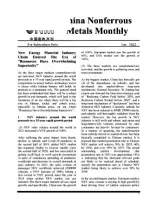Higher Entry Threshold of the Secondary Lead Industry
According to news posted on the Ministry of Industry and Information Technology’s website on September 5, the MIIT and the Ministry of Environmental Protection recently jointly issued the Entry Conditions of the Secondary
Lead Industry (hereinafter referred to as the“Conditions”). It is stipulated that a new secondary lead project must have a minimum production capacity of 50,000 tons/year, secondary lead production capacity below 10,000 tons/year, as well as process and equipment like crucible melting and direct coal-fired reverberatory furnace shall be eliminated.
Under the Conditions, in light of resources, energy conditions and market demand, each province, autonomous region or municipality directly under the central government shall examine and approve secondary lead projects in strict accordance with industry layout and relevant national planning, and inhibit blind expansion. In site selection, a secondary lead enterprise shall conform to the local requirements on air pollution prevention and control, protection of water resources, and ecological conservation.
In the Conditions, enterprises are encouraged to implement secondary lead renovation and expansion projects with a minimum capacity of 50,000 tons/year, and eliminate production capacity below 30,000 tons/year by the end of 2013.
Moreover, secondary lead enterprises must recycle whole waste lead-acid batteries to ensure wastewater discharge and exhaust emission meet relevant national environmental standards.
With regard to energy consumption and comprehensive utilization of resources, the Conditions requires that the comprehensive energy consumption of secondary lead projects, including new, renovated and expanded ones,under which waste containing lead is handled independently, shall be below 130 kg of standard coal per ton of lead; total recovery rate of lead should be above 98% and all waste water should be recycled. Existing secondary lead enterprises’ comprehensive energy consumption indicators shall meet the standard for new projects by the end of 2013.
In addition, the Condition requires that under new, renovated and expanded projects the Environmental Impact Assessment Law shall be implemented strictly. Projects that fail to pass environmental impact assessment are not allowed to start.
 China Nonferrous Metals Monthly2012年10期
China Nonferrous Metals Monthly2012年10期
- China Nonferrous Metals Monthly的其它文章
- Jinchuan Group Breaks Ground for a 300,000-ton Copper Deep Processing Project
- Baiyin Nonferrous Group Company Controls 10 Million Tons of Lead and Zinc Resources through M&A
- Bossay to Invest $1 Billion to Build a Alumina Plant in Indonesia
- Two Rare Earth Groups from Guangdong and Yunnan Team up
- China Gold Group and Xinjiang Sign a Mineral Cooperation Agreement
- Anhui Tongling Invests 1 Billion Yuan to Set up “Copper Industry Fund”
